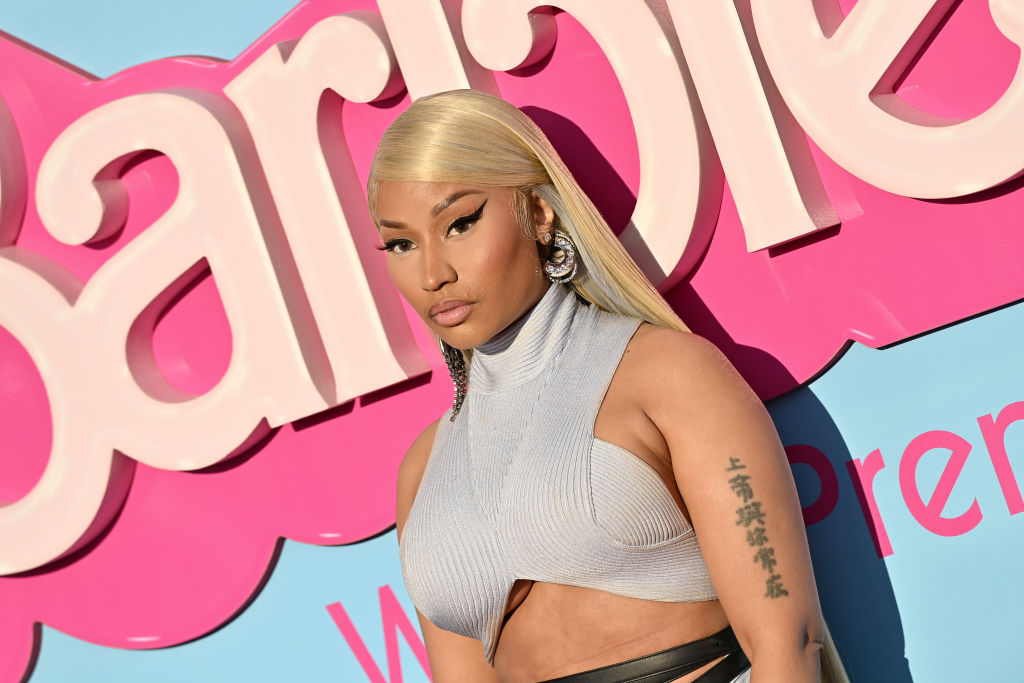A Psychologist Explains Why The Nicki Minaj Challenge Went Viral
A Psychologist Explains Why The Nicki Minaj Challenge Became A Viral Sensation

Since #TheNickiMinaj challenge swept the internet last week amid the rapper’s puzzling and pointed jabs at fellow music artists like SZA and Doechii, over one billion social media users have hopped on books, stacked dumbbells, and pool ledges to prove their physical aptitude on heels. The trend, that popped up seemingly out-of-the-blue and has now spread like wildfire, is an homage to a pose Nicki Minaj clocked in her 2013 music video, “High-School,” balancing on sky-high beige heels beside a pool while rocking a long blonde wig and bubble-gum pink bikini.
Twelve years later, an ordinary scene from an old rap video is now one of the most viral moments of the 2025 summer run, racking up over one billion views and counting. Every post appears aimed at outdoing the one before it, with TikTokers upping the stakes by balancing on increasingly outrageous household items like soda cans or cooking pots. So what’s behind the latest wave of internet peacocking? We spoke to Columbia-trained psychologist, Bea Arthur, about why the high-heeled challenge has the social media world in a chokehold.
Feminine Strength In A #TradeWife Era
Arthur said that one of the driving forces motivating the trend’s popularity is the “brag-a-docious aura” of Nicki herself. “One of the things that makes Black women so awesome and Black people so awesome is that we give ourselves confidence, that cockiness,” she said. The pose celebrates feminine prowess and seemingly superhuman strength, which is a visually captivating combination.
“The core strength in heels, it’s so feminine. All the girls who were doing it in stripper shoes, I was like, ‘Yes,’” Arthur said.
“And how they kept elevating it too. I think Ciara did it on three dumbbells,” she said.
The pose is naturally defiant in a #tradewife era that demands women be more demure and submissive. Arthur said this trend calls forth a new message: “The bad bitch will never die.”
Showing Off Is In Our DNA
Arthur, whose family is from Ghana, says that culturally, people of African descent tend to be “shamelessly cocky,” a thread of gold we derived from our struggles.
“You look at hip-hop, we had to call ourselves kings. We had to put on gold. We had to flex, because it literally wasn’t given.”
She said in Black gay culture, we see the rise of the ballroom king and queen archetypes, who flounce about in a shamelessly vain way, but that’s the magic marginalized people must tap into to create their own sense of value outside of systems of oppression.
“The human soul seeks balance at all times in our actions,” Arthur said. “We seek to be understood, and we seek to be known on a subconscious level.”
Participating in a trend like #thenickiminajchallenge is a chance to be seen and known by others, which is a form of self-regulation, albeit brief, she said.
But seeking validation online can come with a dark side, especially for people who struggle with social isolation. Arthur said posting can cause spikes in dopamine, our brain’s pleasure chemical, which can literally change social media from a pastime into an addiction.
“We’re alone. Right? We’re watching Netflix. We’re scrolling. We’re in the house. We’re not connected. And so these likes feel like love.” she said.
Social Media As Community
Arthur said that it’s no coincidence that TikTok’s popularity took off during COVID when humans were socially and emotionally secluded for months. Viral trends give users an opportunity to feel a part of something, even if it’s online and not in-person.
“We need community. We’re social animals or tribal creatures, so we need to feel part of something and to be seen. These needs are innate, just like food and water,” she said.
Being alone triggers cortisol, which is the body’s stress hormone, to be more present in the blood, according to research. So viral trend participants may feel a sense of belonging and alignment by posting.
“That’s why athletes love sports so much,” she said. “Being with other people who love the game as much as you, is a beautiful thing, a necessary thing. Again, we are tribal social animals, but once it becomes ego serving, then it’s an addiction, and then it’s destructive,” Arthur said.
A Psychologist Explains Why The Nicki Minaj Challenge Became A Viral Sensation was originally published on hellobeautiful.com












